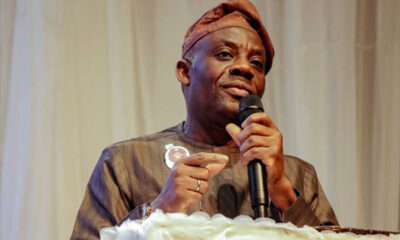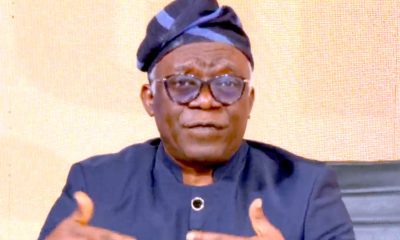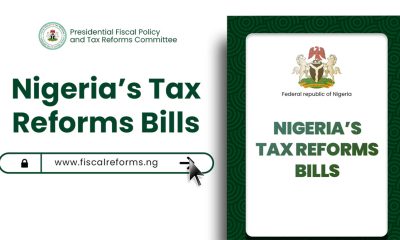News
Labour fumes as FG stops N35,000 award payment
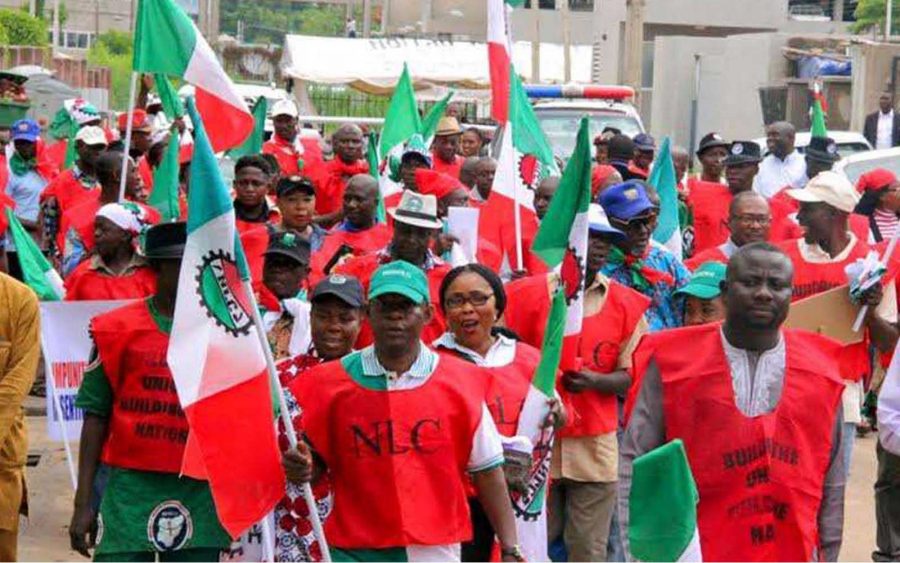
Labour fumes as FG stops N35,000 award payment
The organised Labour and the Federal Government are on a collision course over the government’s failure to sustain the payment of N35,000 wage award to workers.
Workers in the Federal Civil Service, in separate interviews with our correspondent on Monday, noted that the Federal Government only paid N35,000 wage award for September.
Following the removal of the fuel subsidy by President Bola Tinubu on his assumption of office, the Federal Government agreed to pay N35,000 to each of its workers to reduce the hardship caused by the subsidy removal.
The government, in a memo signed by the Chairman, National Salaries Wages and Income Commission, Ekpo Nta, stated that the payment of the wage award would begin to take effect from September 1, 2023.
However findings by our correspondent indicated that the government only paid the wage award for September.
A senior civil servant in one of the core ministries, departments and agencies said, “The wage award was only paid once and I assume that was the one for September. Since then, we have not received another. We all are confused as there has been no official communication from the government as regards the matter. We are all confused at the moment.”
Another civil servant, who spoke to our correspondent on the condition of anonymity, said, “What you heard is true. We have not received anything else other than the initial wage award which was paid. The government cannot continue to let the citizens suffer. Our takehome salaries cannot even take us home any longer at this point.”
Also speaking with our correspondent, a civil servant in one of the Federal Government-owned schools in Abuja noted that the workers were only paid the wage award for one month.
READ ALSO:
- I won’t be satisfied until I end insecurity — Tinubu pledges
- River crisis: 10 APC ward chairmen, leaders, 5,000 APC, SDP members join PDP
- Japa: Canada extends work hours for Nigerian students, others until 2024
“We only received for one month which I assume was for September. Though the peculiar allowance introduced by the former administration is still being paid alongside our salaries, we have not received any such thing as a wage award. The government needs to stop playing games with our emotions.”
The Head of information at the Nigeria Labour Congress, Benson Upah, in an interview with our correspondent said, “This betrays the government’s dishonorable intentions and is completely unacceptable.”
When asked if the NLC would take action, he said, “Certainly, the congress will do something about this but what it will do will be dependent on the appropriate organs of the congress. On communication with the government, sure, we will. It usually precedes our actions.”
But the spokesperson for the Office of the Accountant General of the Federation, Bawa Mokwa, in an interview with our correspondent in Abuja on Monday allayed fears of civil servants. Mokwa noted that plans were ongoing to ensure that civil servants receive their wage awards.
“The process is ongoing. They will be paid. The process to pay the wage awards has commenced.”
Meanwhile, the Federal Government has budgeted N1tn for minimum wage adjustments, promotion arrears and severance benefits for civil servants, an analysis of the 2024 appropriation budget released by the Budget Office of the Federation has revealed.
This is as the head of information of the Nigeria Labour Congress, Upah further explained to our correspondent that the congress would kick against any form of imposition of a new minimum wage by the Federal Government.
Upah told The PUNCH in Abuja that negotiations had yet to commence, but he expressed optimism that talks on the new minimum wage would start soon.
“No, not yet but soon, I suppose,” Upah said when asked if the congress had received notice for the commencement of negotiations surrounding the new minimum wage.
Upah said, “ The national minimum wage law is a product of collective negotiation by all the critical stakeholders, workers, employers (plus private sector), and government. It cannot be fixed by fiat by any stakeholder. Thus, any unilateral action by any party will not only be presumptuous but contemptuous and injurious to other parties and will certainly be at variance with the law and principles governing this variant of minimum wage-setting procedure.”
Labour fumes as FG stops N35,000 award payment
Africa
Nigeria withdraws fighter jets as Benin recovers after failed coup attempt

Nigeria withdraws fighter jets as Benin recovers after failed coup attempt
Nigeria has withdrawn the fighter aircraft it deployed in the Benin Republic following Sunday’s attempted coup, after security assessments confirmed that the situation in the neighbouring country has stabilised. Security sources said the aircraft—initially dispatched from Lagos for surveillance and regional monitoring—were recalled on Sunday afternoon when updated intelligence indicated that the crisis no longer posed “immediate threat to Nigeria’s territorial security.”
The failed coup, aimed at toppling the democratic government of President Patrice Talon, began with an early morning assault on the presidential residence in Cotonou.
Mutinous soldiers, dressed in full military uniform, attempted to seize power but were repelled by loyal forces. Unable to capture the President, the rebels proceeded to take over the Office de Radiodiffusion et Télévision du Bénin (ORTB), briefly controlling the national broadcast signal.
The crisis escalated rapidly, but the Beninese National Guard responded decisively, surrounding the television station and blocking the mutineers’ escape routes.
By late Sunday, loyalist security units had secured all major government installations, restoring order across the capital city.
READ ALSO:
- Dozen Soldiers Held as Benin Govt Thwarts Coup Against President Patrice Talon
- Benin govt says coup attempt foiled as soldiers seize state TV, gunfire rocks Cotonou
- BREAKING: Soldiers Announce Coup in Benin Republic, Declare President Patrice Talon Removed
“The situation is under control. The National Guard has everything surrounded,” a senior security official said, noting that negotiations were initiated to persuade the barricaded mutineers to surrender peacefully.
President Talon, reported safe in an undisclosed location, has yet to address the nation. Meanwhile, the streets of Cotonou remained tense but calm, with no reports of widespread violence or civilian casualties.
Presidential spokesman Bayo Onanuga confirmed in a statement on X that the coup had collapsed.
“Mutineers in military uniform who attempted to overthrow President Patrice Talon’s democratic government have failed. They seized the National TV after failing to enter the presidential residence,” he wrote.
He added that Colonel Pascal Tigri, the alleged leader of the mutiny, was on the run, while several members of the group had been apprehended.
Benin’s Interior Minister Alassane Seidou also appeared on national television, confirming that the military uprising had been foiled. “Early on Sunday, 7 December 2025, a small group of soldiers launched a mutiny aimed at destabilising the state and its institutions. The armed forces remained loyal to the republic, and their response allowed them to foil the attempt,” he said.
The Beninese government has since urged citizens to resume their normal activities, assuring the public that the security situation remains firmly under control.
Nigeria withdraws fighter jets as Benin recovers after failed coup attempt
News
Akpabio sues Natasha for ₦200bn over sexual harassment allegations
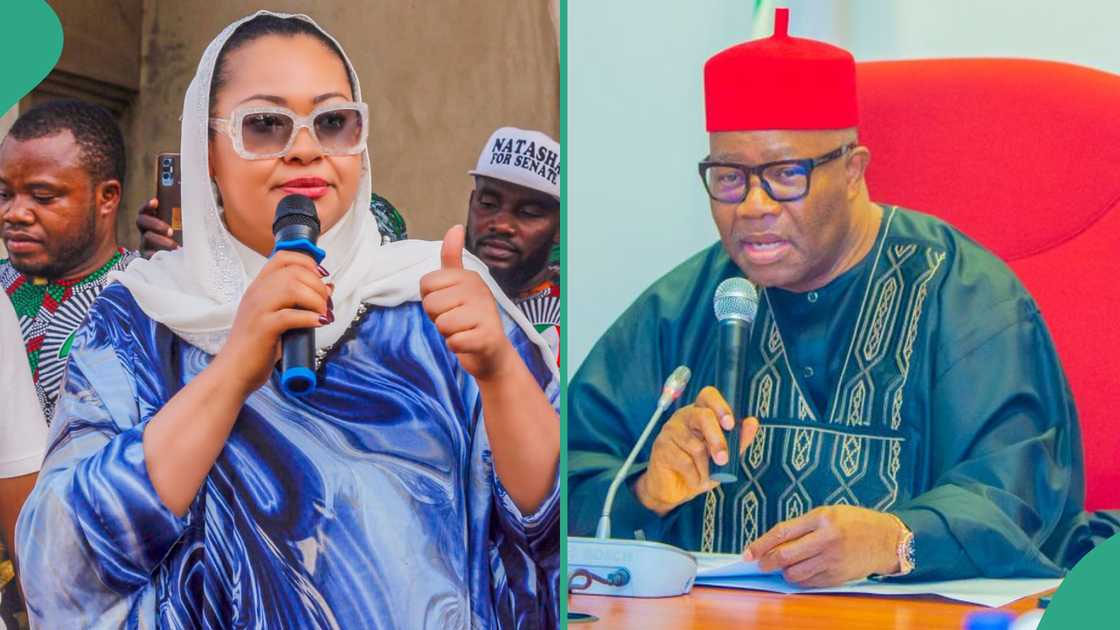
Akpabio sues Natasha for ₦200bn over sexual harassment allegations
Senate President Godswill Obot Akpabio has instituted a ₦200 billion defamation lawsuit against Senator Natasha Akpoti-Uduaghan, accusing her of spreading malicious sexual harassment allegations that he says have severely damaged his public image.
According to documents filed before the High Court of the Federal Capital Territory, Abuja, Akpabio is seeking substantial damages, public retractions, and nationwide broadcast apologies. He argues that Senator Akpoti-Uduaghan’s televised, radio, and online interviews portrayed him as a sexual predator who abused his office for personal gratification—claims he insists subjected him to widespread ridicule and reputational harm.
The lawsuit includes a comprehensive statement of claims and a list of witnesses. Akpabio is also asking the court to compel the removal of all online materials containing the disputed allegations and to order repeated public apologies across major media outlets.
READ ALSO:
- Nigeria joins global ICH elite as NAFDAC achieves full international regulatory Status
- Supreme Court Strikes Out Osun Suit on Withheld Local Govt Allocations
- DSS Arrests Doctor Providing Medical Support to Bandits in Kwara State
A court order issued on 6 November 2025 granted permission for substituted service through the Clerk of the National Assembly after initial attempts to reach Senator Akpoti-Uduaghan directly were unsuccessful. The case is now moving forward and is expected to become one of the most closely watched political legal battles in Nigeria.
Responding on 5 December 2025, Senator Natasha Akpoti-Uduaghan confirmed receipt of the suit and expressed readiness to defend her allegations before a competent court. She stated that she had previously been prevented from presenting a petition before the Senate Committee on Ethics and Privileges due to claims that a related case was already in court—an action she believes protected the Senate President from legislative scrutiny.
In a strongly worded response, the Kogi Central senator maintained that the court proceedings will finally provide the platform to substantiate her claims. She reiterated her stance that she experienced sexual harassment and that her refusal to comply with the alleged advances prompted sustained political retaliation.
“See you in court, Godswill Akpabio,” she declared.
Akpabio sues Natasha for ₦200bn over sexual harassment allegations
News
NLC threatens nationwide protests as insecurity worsens, withdraws support for Labour Party
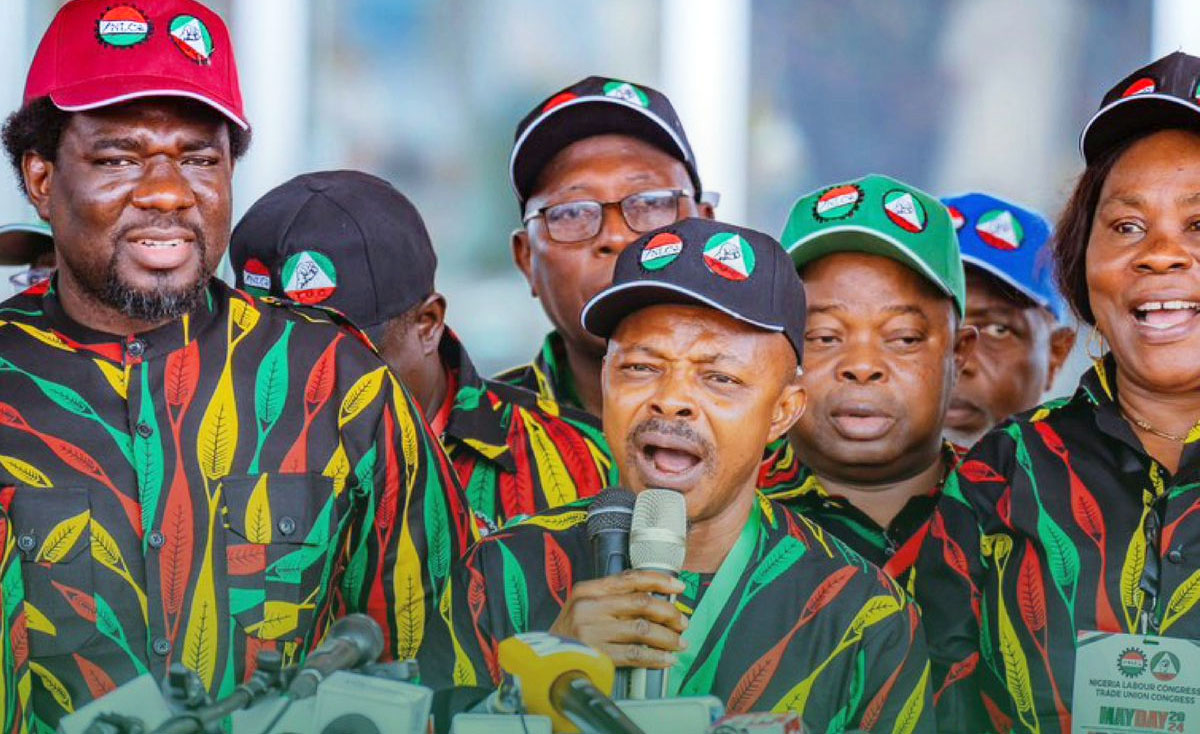
NLC threatens nationwide protests as insecurity worsens, withdraws support for Labour Party
The Nigeria Labour Congress (NLC) has warned that it will no longer remain passive as criminal gangs intensify violent attacks across the country, declaring its readiness to hold a national day of mourning and mobilise nationwide protests over the escalating insecurity in Nigeria.
Speaking at the opening of the NLC’s National Executive Council (NEC) meeting in Lagos, NLC President Joe Ajaero said the country was “under siege,” condemning the latest school kidnapping and the reported withdrawal of security personnel before the attack. He demanded a full investigation to expose any possible compromise within the nation’s security architecture.
“The NLC cannot stand idly by and allow criminals to take over our country—never again. We want to know who ordered the withdrawal of security operatives from that school. We will not allow kidnappers and bandits to overrun our nation,” Ajaero said.
READ ALSO:
- Oshiomhole Seeks Tougher Regulation of Fintech Firms After Cyber Fraud Experience
- Boris Johnson Hails Kemi Badenoch as “Future UK Prime Minister” During Visit to Nigeria
- A troubling message from Guinea-Bissau, by Azu Ishiekwene
He stressed that the labour movement would soon announce details of the planned protests and national mourning, insisting the lives of teachers, students and workers were in grave danger. “It is getting out of hand. We can no longer bear this,” he added.
Ajaero also revealed that the NLC had withdrawn its representatives from the Labour Party, accusing them of pursuing personal interests rather than representing workers.
Human rights lawyer Femi Falana, SAN, who addressed the meeting, warned that the country was in “serious trouble” over rising kidnappings and attacks. He rejected calls for foreign military intervention, cautioning that such a move would undermine Nigeria’s sovereignty.
Falana criticised recent statements by former U.S. President Donald Trump, describing them as unacceptable. He urged President Bola Tinubu to take decisive action to protect citizens, saying: “We want to let the world know that we are not a conquered people.”
He called on labour unions, civil society organisations and Nigerians to prepare to resist any further decline in national security.
NLC threatens nationwide protests as insecurity worsens, withdraws support for Labour Party
-

 Sports2 days ago
Sports2 days ago2026 FIFA World Cup Draw: England Draw Croatia as Brazil Face Morocco in Tournament Opener
-

 News2 days ago
News2 days agoAkpabio sues Natasha for ₦200bn over sexual harassment allegations
-

 metro3 days ago
metro3 days agoTinubu Govt Eliminates More Terrorists Than Previous Administrations — Fani-Kayode
-

 Politics2 days ago
Politics2 days agoOsogbo Youth Group Condemns APC Over Disqualification of Adegoke SAN
-

 metro1 day ago
metro1 day agoNigerian woman sparks outrage for refusing chemotherapy despite ₦30 million donations over religious Beliefs
-

 metro2 days ago
metro2 days agoFour Teenagers Killed in Banki Explosion as Borno Police Probe Deadly IED Blast
-
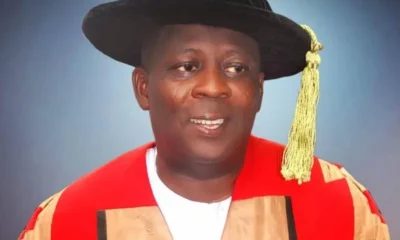
 Opinion3 days ago
Opinion3 days agoSiyan Oyeweso: Lessons in virtue and vanity
-

 Entertainment3 days ago
Entertainment3 days agoDStv warns subscribers of possible loss of CNN, discovery, 10 other channels in 2026



